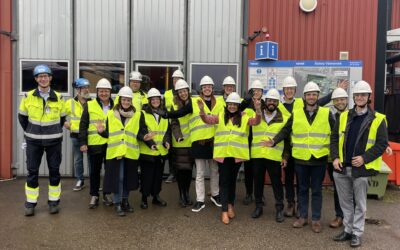Carbon budget calls for near elimination of landfill • New Scottish partnership to deliver low-carbon heat networks • University set to decarbonise heating using heat pump technology • Read more about the developments in sustainable heating and cooling in this month's news update from the UK
The UK’s Climate Change Committee (CCC) has issued its strongest recommendation on waste emissions yet, calling for the near-total elimination of waste sent to landfill by 2040. The recommendation is part of the CCC’s seventh Carbon Budget, published in February 2025, which outlines a clear pathway to achieving an 87% reduction in national greenhouse gas emissions by 2040, compared to 1990 levels.
The report highlights landfill methane emissions as the main contributor to waste sector emissions and calls for urgent action. In particular, it proposes that all biogenic waste, such as food waste, must be completely diverted from landfill by 2028. It also recommends that any new Energy from Waste (EfW) facilities should only be approved if they are designed to be compatible with carbon capture and storage (CCS) systems.
The CCC underscores CCS as critical” to achieving the UK’s industrial decarbonisation targets. According to the Committee, engineered carbon removals, including EfW with CCS, could contribute over 20% of the 35 million tonnes of negative emissions needed to meet the central net zero scenario.
The CCC’s latest budget signals a tightening policy environment around landfill and highlights the importance of innovation and investment in sustainable waste treatment technologies.
Red more in article from Let’s Recycle
SSE Energy Solutions and Scottish Water Horizons have launched a new strategic partnership to drive the development of low-carbon heat networks across Scotland, starting with an innovative project in Inverness.
Announced in March 2025, the collaboration seeks to harness potential of wastewater as a renewable energy source by capturing and reusing the energy it contains through district heating systems. The first project, supplied by a Scottish Water pumping station in Inverness, will serve a range of public and private buildings, including local offices for both partner organisations.
The wider ambition is to create a replicable model for decarbonising heat, which currently accounts for over a third of the UK’s total carbon emissions. By leveraging existing infrastructure, the partnership aligns with the Scottish Government’s Heat Networks Delivery Plan and the Heat Networks (Scotland) Act 2021, which set ambitious goals for low-carbon heat delivery; 2.6TWh by 2027 and 6TWh by 2030.
With more local authorities set to implement heat network zoning policies this year, further projects are expected to follow.
Read more in article from Scottish Construction Now
Lancaster University has officially begun construction on its new energy centre which will close to eliminate the use of natural gas across its campus through the deployment of heat pumps. This project is a significant part of the university’s commitment to achieving net zero carbon emissions from energy use by 2030.
The new energy centre will be equipped with a 7MW combination of air- and water-source heat pumps alongside a 1MW electric boiler. Collectively, these systems are expected to generate 39GWh of low-carbon heat annually, enough to supply 95% of the university’s buildings. The project will include the installation of 6.5km of new district heating pipework, expanding coverage from 65% to 95% of campus buildings, and connecting 247 individual properties to the network.
The facility will include 1,500m³ of thermal storage to stabilise supply during peak demand, and a dedicated visitor centre designed to educate students, researchers, and the public on the role of heat pump technology in a sustainable future.
Backed by more than £21 million from the Government’s Green Heat Network Fund (GHNF) and additional university investment, the project is a partnership with Vital Energi. The facility is expected to save 2.700 tonnes of carbon annually once completed in 2027.
Read more in article from Cooling Post
To stay updated on news for sustainable heating and cooling, follow us on LinkedIn, and subscribe to our Newsletter.
Sweden is at the forefront of decentralised heat networks technology. Our aim for “Sustainable Heating & Cooling by Sweden” is to facilitate knowledge sharing between British, French and Swedish stakeholders and develop and encourage environmental and economic best practice.
To find out how we can help you and your organisation, please contact our London or Paris-based “SHC” teams. We can introduce you to leading consultants, suppliers of technology and services who will be pleased to share know-how of the development of sustainable heating & cooling solutions.


